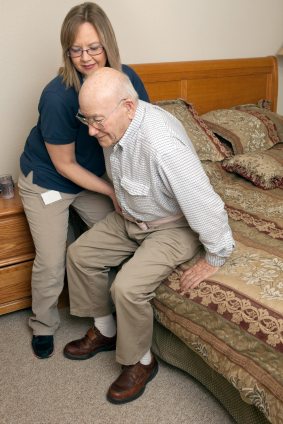Home Care in Grand Rapids, MI : Understand the Resources Needed to Keep Seniors in Their Own Homes
According to a report by the MetLife Mature Market Institute, most people over the age of 45 express a desire to live in their own home even when assistance becomes necessary. In addition, over 25 percent of seniors report that they fear the loss of their independence and moving to a nursing home more than they fear death itself. However, home care is often possible with adequate support, resources and information.
in their own home even when assistance becomes necessary. In addition, over 25 percent of seniors report that they fear the loss of their independence and moving to a nursing home more than they fear death itself. However, home care is often possible with adequate support, resources and information.
As individuals age, the need for assistance tends to grow, often in accordance to health problems that progressively worsen or multiply. While nursing homes are often the traditional solution for many elder care problems, home care is another option that often allows the senior to remain in their home and maintain a sense of independence, privacy and dignity. However, as with any other solutions, keeping the senior at home requires some advance planning.
Budget
According to the MetLife report, one in five seniors in the U.S. faces considerable costs for long-term care. Most insurance companies offer only limited health care costs and only if “skilled care needs” are included in the policy.
Seniors and their families should plan for long-term costs including a home care companion, changes to accompany the senior’s movement and safety in the home, transportation, entertainment, prescription and over-the-counter medication as well as co-pays, laboratory tests and other medical costs.
Daily Tasks
Some of the tasks that most healthy adults take for granted but many seniors require assistance for include bathing, dressing, eating, walking, toileting and taking medication as recommended/prescribed. Home companions and family members can assist the senior with these daily tasks and allow them to remain in the home through adequate elder care, thereby maintaining a sense of dignity and independence.
Transportation
Another necessary aspect of home-based care includes transportation to and from doctor’s appointments, running errands and visiting friends and family. A home companion, family members or some services that provide transportation for seniors to various activities and appointments may meet this need.
Meals
Many seniors can no longer perform grocery shopping or meal preparation on their own and require assistance for these tasks. Again, this is a need that home companions may help fill, as can family members and some organizations that visit seniors daily to bring them meals.
Home Design
As seniors age, their needs in the home change and require modification to the home as a result. For example, an individual may no longer be able to navigate stairs safely or easily or might have difficulty getting in and out of the shower or bathtub. In addition, the home needs to be well lit and clear of clutter or items that may cause the senior to trip or fall.
Entertainment
No one wants to sit around all day with nothing to do, so entertainment is a necessary element when it comes to senior home living arrangements. This may include television, movies, reading, music, puzzles and regular visitors as well as social outings.
The coordination of all of these factors typically requires a person to act as a care coordinator to ensure that all aspects of care at home are present. Finding the necessary resources and support to do so is often an expensive proposition. Both planning and saving should be performed in advance as much as possible to alleviate the associated costs and to prepare adequately for the senior to remain at home as long as possible.
- What Are Some Fun Warm Weather Activities Seniors Can Try? - May 14, 2025
- Caregiver of the Month – May 2025 - May 8, 2025
- Bladder Cancer Symptoms and Risks - May 7, 2025
